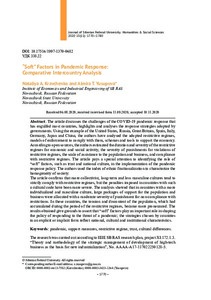“Soft” Factors in Pandemic Response: Comparative Intercountry Analysis
Скачать файл:
URI (для ссылок/цитирований):
https://elib.sfu-kras.ru/handle/2311/137747Автор:
Kravchenko, Nataliya A.
Yusupova, Almira T.
Кравченко, Н.А.
Юсупова, А.Т.
Дата:
2020-11Журнал:
Журнал Сибирского федерального университета. Гуманитарные науки. Journal of Siberian Federal University. Humanities & Social Sciences;2020 13 (11)Аннотация:
The article discusses the challenges of the COVID-19 pandemic response that has engulfed most countries, highlights and analyses the response strategies adopted by governments. Using the example of the United States, Russia, Great Britain, Spain, Italy, Germany, Japan and China, the authors have analysed the adopted restrictive regimes, models of enforcement to comply with them, schemes and tools to support the economy.
According to open sources, the authors estimated the duration and severity of the restrictive regimes for economic and social activity, the severity of punishments for violations of restrictive regimes, the scale of assistance to the population and business, and compliance with restrictive regimes. The article pays a special attention to identifying the role of “soft” factors, such as trust and national culture, in the implementation of the pandemic response policy. The authors used the index of ethnic fractionalization to characterize the homogeneity of society.
The article confirms that more collectivist, long-term and less masculine cultures tend to strictly comply with restrictive regimes, but the penalties imposed in countries with such a cultural code have been more severe. The analysis showed that in countries with a more individualized and masculine culture, large packages of support for the population and business were allocated with a moderate severity of punishment for non-compliance with restrictions. In these countries, the tension and discontent of the population, which had accumulated during the period of the restrictive regimes, became more pronounced. The results obtained give grounds to assert that “soft” factors play an important role in shaping the policy of responding to the threat of a pandemic; the strategies chosen by countries in an explicit or implicit form reflect national, cultural and institutional characteristics В статье обсуждаются проблемы борьбы с пандемией COVID-19,
охватившей большинство стран, выделяются и анализируются стратегии
реагирования, принятые правительствами. На примере США, России,
Великобритании, Испании, Италии, Германии, Японии и Китая проанализированы
принятые ограничительные режимы, модели принуждения к их соблюдению,
схемы и инструменты поддержки экономики.
По данным открытых источников оценивалась длительность и строгость режимов
ограничений экономической и социальной активности, жесткость наказаний
за нарушения режимов ограничений, масштаб помощи населению и бизнесу и
соблюдение режима ограничений. Особое внимание уделено выявлению роли в
реализации политики борьбы с пандемией «мягких» факторов, таких как доверие и
национальная культура. Для характеристики однородности общества использован
индекс этнической фракционализации.
Было подтверждено, что более коллективистские, долгосрочно ориентированные и
менее маскулинные культуры склонны строго соблюдать ограничительные режимы,
однако и меры наказания, введенные в странах с таким культурным кодом, оказались
более жесткими. Анализ показал, что в странах с более индивидуализированной и
маскулинной культурой были выделены крупные пакеты поддержки населения и
бизнеса при умеренной жесткости наказания за несоблюдение ограничений. В этих
странах сильнее проявилось напряжение и недовольство населения, накопившееся
за время действия ограничительных режимов. Полученные результаты дают
основания утверждать, что «мягкие» факторы играют важную роль в формировании
политики реагирования на угрозу пандемии, выбранные странами стратегии в явной
или неявной форме отражают национальные, культурные и институциональные
особенности

